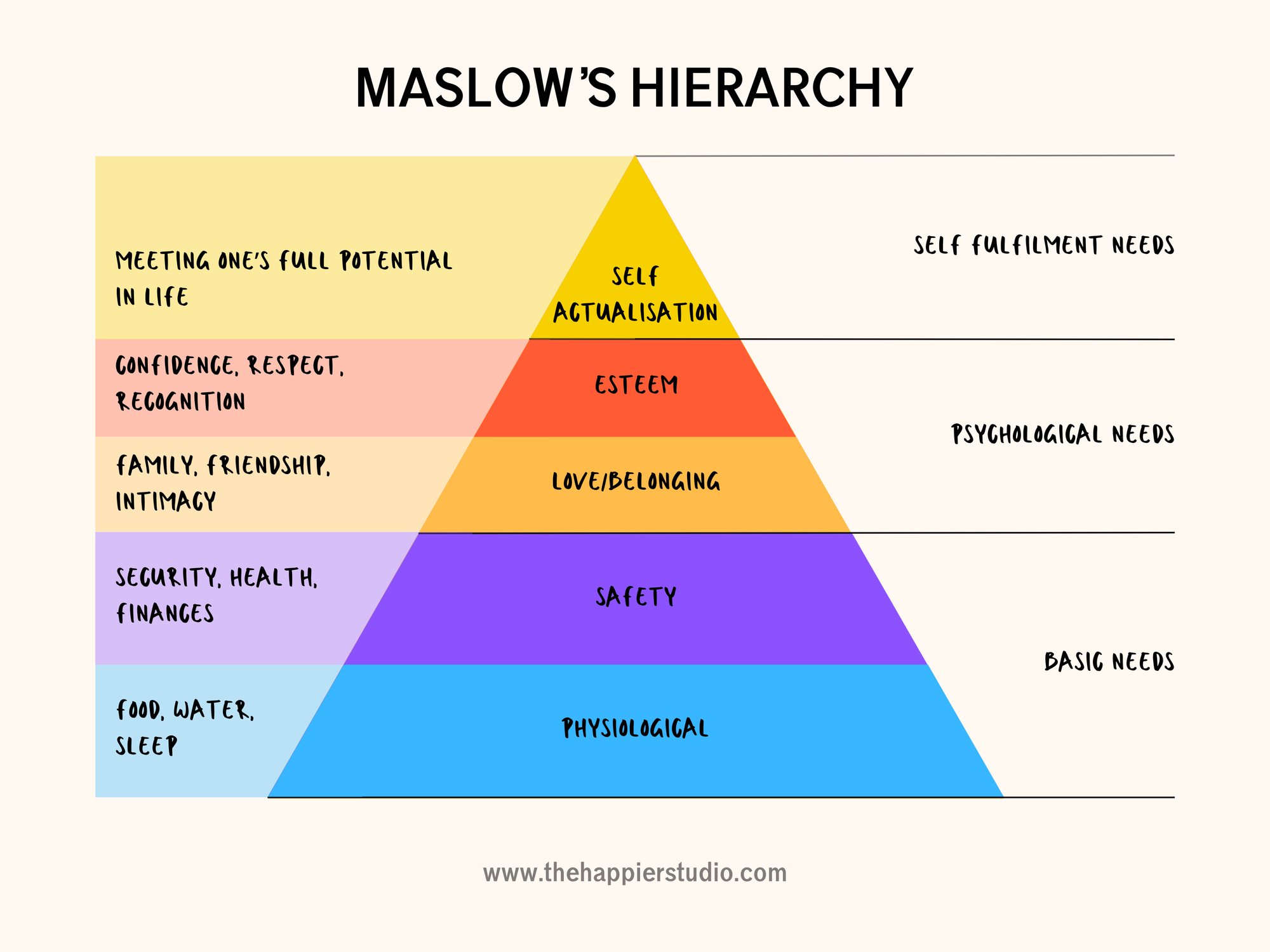May 18, 2025 | #40 | read on The Happier Studio | Free Version
Welcome to The Happier Newsletter, a weekly newsletter where I provide actionable ideas to help you build a happier, healthier, and more meaningful life.
What’s On Today
- Why Negative Emotions Matter
- What Maslow Got Right (and What Most People Miss)
- The Science of Happiness and Wanting
- So What Does Taking Control Actually Look Like?

If someone asked you, “What do you really want out of life?”
You’d probably say something like:
“To be happy.”
“To feel fulfilled.”
“To live a good life.”
And of course, you’re not wrong.
But here’s the thing: that answer won’t get you very far.
Why?
Becasue it’s too broad to mean anything. Too safe to spark real action. And everyone wants that.
There’s a far more powerful question you can ask yourself:
👉 What kind of discomfort are you willing to endure?
Because the truth is, most people want to be rich, fit or be in a meanigful relationship, but they don't want to put in the effort.
- 💸 Everyone wants to be rich. But are you willing to work weekends, take risks, and show up when no one’s clapping? Are you willing to fail publicly, get back up, and keep going even when it feels like no one’s watching?
- 💪 Everyone wants to be fit and energised. But are you willing to move your body when you’d rather lie down? Are you willing to cook instead of order takeout, to prioritise rest over hustle, to care for your future self even when your present self wants comfort?
- ❤️ Everyone wants a meaningful relationship. But are you willing to sit through the tough conversations, navigate miscommunications, and keep choosing love, even when it’s inconvenient? Are you willing to grow with someone, even when it’s slow and messy?
Wanting is easy…
Choosing the struggle that comes with it, that’s what builds a fulfilling life.
Why Negative Emotions Matter
Here’s something that might surprise you: You need negative emotions to be happy.
We often think of happiness as the absence of pain. But in reality, it’s the ability to feel the full spectrum of life and still find meaning in it.
Psychologically, negative emotions like sadness, anger, and fear serve vital purposes. They’re not bad, they’re data. They help us reflect, re-align, and realise what matters most.
Positive emotions expand our awareness. But negative emotions deepen it. And that depth is often where meaning lives.
As actor Andrew Garfield once said about losing his mother:
“I hope this grief stays with me, because it’s all the unexpressed love I didn’t get to tell her.”
What Maslow Got Right (and What Most People Miss)

In his hierarchy of human needs, psychologist Abraham Maslow described how we move from basic needs like food and safety, up to emotional needs like belonging, and ultimately toward self-actualisation, living fully and authentically.
But here’s what often gets missed: self-actualisation isn’t about achieving a peak state of bliss. It’s about growth, purpose, and becoming who you truly are. And that path isn’t easy. It often includes setbacks, uncertainty, and emotional discomfort.
You grow through challenge. You find purpose through effort. You build character not in moments of ease, but in moments of decision.
Mark Manson said it well:
“The quality of your life is not determined by the quality of your positive experiences, but by the quality of your negative experiences.”
It’s not about how many good things you can collect. It’s about how well you carry the difficult things that matter.
The Science of Happiness and Wanting
We all want happiness, but the science is clear: lasting happiness isn’t about getting everything you want. It’s about learning to be satisfied with what you have.
Research in positive psychology shows that people who experience higher wellbeing have meaningful goals, close relationships, and a sense of progress. They focus on internal factors, rather than external factors.
But here’s the catch: all of those things require effort. They come with sacrifice. They invite discomfort.
Deep relationships require vulnerability. Growth requires failure. Purpose requires discipline. The things that fulfil us most don’t come without cost and that’s exactly what makes them so meaningful.
The real trap? Believing that once you get the job, the money, the body, the house, then you’ll finally be happy. In reality, that endless pursuit can leave you feeling emptier than ever. Because when happiness is treated like a finish line, it always moves.
So, instead of chasing “more,” we need to choose “better.”
Better struggles. Better questions. Better meaning.
So What Does Taking Control Actually Look Like?
“Take control of your life” sounds good in theory. But in practice? It looks a lot less like a breakthrough moment and a lot more like showing up when it’s hard. These are common traits of people who lean into discomfort:
✅ Psychological flexibility. This means they can sit with discomfort and still take action. It's the ability to be in the present moment, accept difficult thoughts and emotions, and take action aligned with one's values, even when facing challenges.
✅ An internal locus of control. They believe that their life is shaped by their choices, not just their circumstances. That belief alone boosts motivation, resilience, and success.
✅ Action before readiness. Confidence doesn’t come from having it all figured out. It comes from doing. Even when it’s messy. Even when you’re afraid. Because momentum is what rewires your brain, not motivation.
So, if life isn’t about waiting for the perfect moment, and it’s not about chasing constant happiness, then what is it about?
It’s about getting radically honest with yourself. Not just about what you want, but about what you’re willing to endure to create it.
Because in the end, a meaningful life isn’t built by chasing ease or avoiding pain. It’s built by choosing the kind of discomfort that’s worth it. Over and over again.
It’s the one question that changes everything:
👉 What kind of discomfort are you willing to endure?
